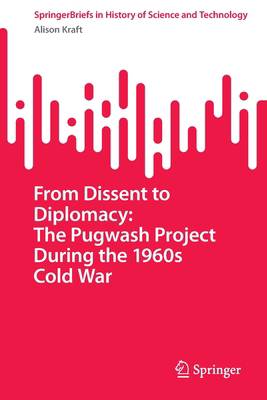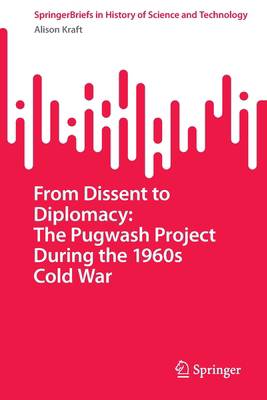
- Retrait gratuit dans votre magasin Club
- 7.000.000 titres dans notre catalogue
- Payer en toute sécurité
- Toujours un magasin près de chez vous
- Retrait gratuit dans votre magasin Club
- 7.000.0000 titres dans notre catalogue
- Payer en toute sécurité
- Toujours un magasin près de chez vous
From Dissent to Diplomacy: The Pugwash Project During the 1960s Cold War
Alison Kraft
52,95 €
+ 105 points
Description
This book provides new and critical perspectives on the internal development of the Pugwash Conferences on Science and World Affairs (the PCSWA; Pugwash) and its role in international nuclear diplomacy during the 1960s Cold War. Conceived by western scientists dissenting from their own government's position on nuclear weapons, the conferences brought together elite scientists from across the East-West divide to work towards nuclear disarmament and for peace. The analysis follows two lines. First, the book charts the emergence during the conferences of a distinctive form of technopolitical communication that was crucial to the role of Pugwash in Informal cross-bloc dialogue about disarmament. This enabled Pugwash to realize its paradoxical vision of working both with and against governments to promote disarmament and was key to its role as both a forum for and actor within the realm of informal diplomacy. It is argued that Pugwash scientists formed the vanguard of what came in the1960s to be called Track II diplomacy. The relevance of the contemporary concept of Science Diplomacy for Pugwash is discussed. The second analytical focus of the book centers on the internal dynamics of the international Pugwash organization. It is argued that informal modes of working and a code of confidentiality accorded the leadership enormous power and autonomy: this small network of senior figures was able to control the Pugwash agenda and priorities, and to launch diplomatic initiatives beyond the conferences. However, by 1967, competing interests were fueling tensions and instability within Pugwash as it struggled for coherence and direction amid with the political challenges posed by the Vietnam War and European security. This crisis manifest the limits of the Pugwash project and placed its future in doubt.
Spécifications
Parties prenantes
- Auteur(s) :
- Editeur:
Contenu
- Nombre de pages :
- 140
- Langue:
- Anglais
- Collection :
Caractéristiques
- EAN:
- 9783031121340
- Date de parution :
- 23-10-22
- Format:
- Livre broché
- Format numérique:
- Trade paperback (VS)
- Dimensions :
- 156 mm x 234 mm
- Poids :
- 222 g

Les avis
Nous publions uniquement les avis qui respectent les conditions requises. Consultez nos conditions pour les avis.






